Dermott Hayes's Blog: Postcard from a Pigeon, page 66
June 21, 2016
Walk out Backwards, So I’ll think you’re Walking in, that referendum
A.A. Gill, of The Sunday Times, is a food critic with, an often, poisonous turn of phrase. Someone posted his recent opinion piece on the forthcoming British referendum on Brexit or Remain. It’s worth repeating here. (prompted by Ritu in https://butismileanyway.wordpress.com/2016/06/21/should-we-stay-or-should-we-go/)
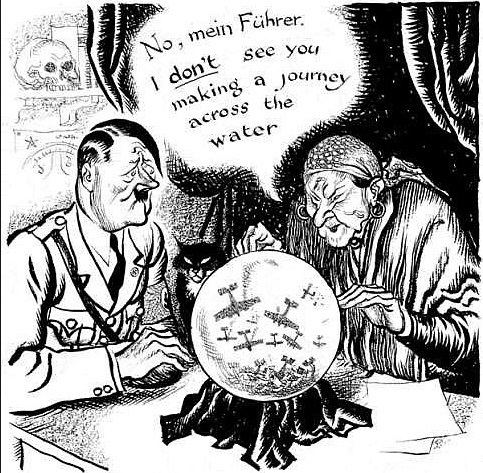
poisonpage.blogspot.com
It was the woman on Question Time that really did it for me. She was so familiar. There is someone like her in every queue, every coffee shop, outside every school in every parish council in the country. Middle-aged, middle-class, middle-brow, over-made-up, with her National Health face and weatherproof English expression of hurt righteousness, she’s Britannia’s mother-in-law. The camera closed in on her and she shouted: “All I want is my country back. Give me my country back.”
It was a heartfelt cry of real distress and the rest of the audience erupted in sympathetic applause, but I thought: “Back from what? Back from where?”
Wanting the country back is the constant mantra of all the outies. Farage slurs it, Gove insinuates it. Of course I know what they mean. We all know what they mean. They mean back from Johnny Foreigner, back from the brink, back from the future, back-to-back, back to bosky hedges and dry stone walls and country lanes and church bells and warm beer and skittles and football rattles and cheery banter and clogs on cobbles. Back to vicars-and-tarts parties and Carry On fart jokes, back to Elgar and fudge and proper weather and herbaceous borders and cars called Morris. Back to victoria sponge and 22 yards to a wicket and 15 hands to a horse and 3ft to a yard and four fingers in a Kit Kat, back to gooseberries not avocados, back to deference and respect, to make do and mend and smiling bravely and biting your lip and suffering in silence and patronising foreigners with pity.
We all know what “getting our country back” means. It’s snorting a line of the most pernicious and debilitating Little English drug, nostalgia. The warm, crumbly, honey-coloured, collective “yesterday” with its fond belief that everything was better back then, that Britain (England, really) is a worse place now than it was at some foggy point in the past where we achieved peak Blighty. It’s the knowledge that the best of us have been and gone, that nothing we can build will be as lovely as a National Trust Georgian country house, no art will be as good as a Turner, no poem as wonderful as If, no writer a touch on Shakespeare or Dickens, nothing will grow as lovely as a cottage garden, no hero greater than Nelson, no politician better than Churchill, no view more throat-catching than the White Cliffs and that we will never manufacture anything as great as a Rolls-Royce or Flying Scotsman again.
The dream of Brexit isn’t that we might be able to make a brighter, new, energetic tomorrow, it’s a desire to shuffle back to a regret-curdled inward-looking yesterday. In the Brexit fantasy, the best we can hope for is to kick out all the work-all-hours foreigners and become caretakers to our own past in this self-congratulatory island of moaning and pomposity.
And if you think that’s an exaggeration of the Brexit position, then just listen to the language they use: “We are a nation of inventors and entrepreneurs, we want to put the great back in Britain, the great engineers, the great manufacturers.” This is all the expression of a sentimental nostalgia. In the Brexiteer’s mind’s eye is the old Pathé newsreel of Donald Campbell, of John Logie Baird with his television, Barnes Wallis and his bouncing bomb, and Robert Baden-Powell inventing boy scouts in his shed.
All we need, their argument goes, is to be free of the humourless Germans and spoilsport French and all their collective liberalism and reality. There is a concomitant hope that if we manage to back out of Europe, then we’ll get back to the bowler-hatted 1950s and the Commonwealth will hold pageants, fireworks displays and beg to be back in the Queen Empress’s good books again. Then New Zealand will sacrifice a thousand lambs, Ghana will ask if it can go back to being called the Gold Coast and Britain will resume hand-making Land Rovers and top hats and Sheffield plate teapots.
There is a reason that most of the people who want to leave the EU are old while those who want to remain are young: it’s because the young aren’t infected with Bisto nostalgia. They don’t recognise half the stuff I’ve mentioned here. They’ve grown up in the EU and at worst it’s been neutral for them.
The under-thirties want to be part of things, not aloof from them. They’re about being joined-up and counted. I imagine a phrase most outies identify with is “women’s liberation has gone too far”. Everything has gone too far for them, from political correctness — well, that’s gone mad, hasn’t it? — to health and safety and gender-neutral lavatories. Those oldies, they don’t know if they’re coming or going, what with those newfangled mobile phones and kids on Tinder and Grindr. What happened to meeting Miss Joan Hunter Dunn at the tennis club? And don’t get them started on electric hand dryers, or something unrecognised in the bagging area, or Indian call centres , or the impertinent computer asking for a password that has both capitals and little letters and numbers and more than eight digits.
Brexit is the fond belief that Britain is worse now than at some point in the foggy past where we achieved peak Blighty
We listen to the Brexit lot talk about the trade deals they’re going to make with Europe after we leave, and the blithe insouciance that what they’re offering instead of EU membership is a divorce where you can still have sex with your ex. They reckon they can get out of the marriage, keep the house, not pay alimony, take the kids out of school, stop the in-laws going to the doctor, get strict with the visiting rights, but, you know, still get a shag at the weekend and, obviously, see other people on the side.
Really, that’s their best offer? That’s the plan? To swagger into Brussels with Union Jack pants on and say: “ ’Ello luv, you’re looking nice today. Would you like some?”
When the rest of us ask how that’s really going to work, leavers reply, with Terry-Thomas smirks, that “they’re going to still really fancy us, honest, they’re gagging for us. Possibly not Merkel, but the bosses of Mercedes and those French vintners and cheesemakers, they can’t get enough of old John Bull. Of course they’re going to want to go on making the free market with two backs after we’ve got the decree nisi. Makes sense, doesn’t it?”
Have no doubt, this is a divorce. It’s not just business, it’s not going to be all reason and goodwill. Like all divorces, leaving Europe would be ugly and mean and hurtful, and it would lead to a great deal of poisonous xenophobia and racism, all the niggling personal prejudice that dumped, betrayed and thwarted people are prey to. And the racism and prejudice are, of course, weak points for us. The tortuous renegotiation with lawyers and courts will be bitter and vengeful, because divorces always are and, just in passing, this sovereignty thing we’re supposed to want back so badly, like Frodo’s ring, has nothing to do with you or me. We won’t notice it coming back, because we didn’t notice not having it in the first place.
You won’t wake up on June 24 and think: “Oh my word, my arthritis has gone! My teeth are suddenly whiter! Magically, I seem to know how to make a soufflé and I’m buff with the power of sovereignty.” This is something only politicians care about; it makes not a jot of difference to you or me if the Supreme Court is a bunch of strangely out-of-touch old gits in wigs in Westminster or a load of strangely out-of-touch old gits without wigs in Luxembourg. What matters is that we have as many judges as possible on the side of personal freedom.
Personally, I see nothing about our legislators in the UK that makes me feel I can confidently give them more power. The more checks and balances politicians have, the better for the rest of us. You can’t have too many wise heads and different opinions. If you’re really worried about red tape, by the way, it’s not just a European problem. We’re perfectly capable of coming up with our own rules and regulations and we have no shortage of jobsworths. Red tape may be annoying, but it is also there to protect your and my family from being lied to, poisoned and cheated.
The first “X” I ever put on a voting slip was to say yes to the EU. The first referendum was when I was 20 years old. This one will be in the week of my 62nd birthday. For nearly all my adult life, there hasn’t been a day when I haven’t been pleased and proud to be part of this great collective. If you ask me for my nationality, the truth is I feel more European than anything else. I am part of this culture, this European civilisation. I can walk into any gallery on our continent and completely understand the images and the stories on the walls. These people are my people and they have been for thousands of years. I can read books on subjects from Ancient Greece to Dark Ages Scandinavia, from Renaissance Italy to 19th-century France, and I don’t need the context or the landscape explained to me. The music of Europe, from its scales and its instruments to its rhythms and religion, is my music. The Renaissance, the rococo, the Romantics, the impressionists, gothic, baroque, neoclassicism, realism, expressionism, futurism, fauvism, cubism, dada, surrealism, postmodernism and kitsch were all European movements and none of them belongs to a single nation.
There is a reason why the Chinese are making fake Italian handbags and the Italians aren’t making fake Chinese ones. This European culture, without question or argument, is the greatest, most inventive, subtle, profound, beautiful and powerful genius that was ever contrived anywhere by anyone and it belongs to us. Just look at my day job — food. The change in food culture and pleasure has been enormous since we joined the EU, and that’s no coincidence. What we eat, the ingredients, the recipes, may come from around the world, but it is the collective to and fro of European interests, expertise and imagination that has made it all so very appetising and exciting.
The restaurant was a European invention, naturally. The first one in Paris was called The London Bridge.
Culture works and grows through the constant warp and weft of creators, producers, consumers, intellectuals and instinctive lovers. You can’t dictate or legislate for it, you can just make a place that encourages it and you can truncate it. You can make it harder and more grudging, you can put up barriers and you can build walls, but why on earth would you? This collective culture, this golden civilisation grown on this continent over thousands of years, has made everything we have and everything we are, why would you not want to be part of it?
I understand that if we leave we don’t have to hand back our library ticket for European civilisation, but why would we even think about it? In fact, the only ones who would are those old, philistine scared gits. Look at them, too frightened to join in.


Finnegans Wake: Book 2.3
more hilarious rumbles from the rambling PorterGirl on her journey to a Wake
This post contains references to some uncomfortable subjects such as rape, incest and paedophilia. Nothing is discussed in any detail, but not everyone wants to read about that stuff and I didn’t want to spring it on you. Also there is some swearing from me, just because I feel like it.
This is an absolute bastard of a chapter. For a start, it’s nearly 70 pages long, which might as well be in dog years with Joyce’s style. It is set in the bar of Here Comes Everybody’s pub. The ever-present 12 customers (who are also the jury, if you remember) provide us with one narrative, whilst two other stories are broadcast over a radio and a television, interspersed with a horse racing programme.
The story on the radio is about a Norwegian Captain who has a lobster claw and most likely represents HCE. There are random nautical adventures where…
View original post 892 more words


Ending, before it Begins, Again
Every morning he wakes; the urge to piss, a physical reminder to begin, again. In that waking twilight, sleeping eyes un-glue themselves then memory intrudes, followed, like the reluctant schoolboy, by habit.
He checks the time, 6.20am and thinks, should he take another hour in the Orpheus Oblivion, the night time express, on its final round; to the post-piss terminal, that time when he might wish, even dream, it might end, before he gets off.
Age is not a friendly travel companion. Every sight’s been seen and every station visited but now the trains are faster, the doors open and close with a mind of their own and ghostly voices, not a gruff man with tobacco stained hands and a whistle, tell you to ‘mind the gap.’
A foreign phrase springs to mind, ‘plus, ça change, c’est plus, la même chose’ and remembers then, a pocket transistor given to him by an American cousin, when he was six. It had two dials; one for on/off and volume, the other, the secret codes to another world and somewhere between ‘8’ and ’12’, a passport to sounds and music, hardwired now to his perception of life and his living, Luxembourg and Caroline.
He had a digital clock/radio in his working days that woke him with the 7am radio news. On the morning train, fellow travellers complained of whatever woke them up, because the coffee was cold or the toast burned, as though they woke with their heads in a kitchen. But he knew, it was their way of saying, ‘I’m too busy for breakfast, the machine does it for me.’
So, he rises, checks his blood sugar level, injections of insulin, turns on the shower and undresses, washes, dries, then papers his body with fragrant unctions, designed to help him forget his human body, an illusion bought and sold to generations, before and after.
Distracted, now, as though he’s taken a wrong turn, a misstep, he reaches for his iphone and checks the headlines on his Guardian app, his emails and then, Facebook. What did he do before them? Yes, he remembers, music or news and sometimes, both.
He turns on his laptop, then itunes and a playlist he’s made for himself and continues to compile. He calls it, Everything I Want to Hear and the first voice he hears is the sonorous rumble of Solomon Burke, imploring him, ‘Don’t Give Up on Me’, then Scott Walker, ‘If You Go Away’, he skips forward, impatient and Richard Hawley is asking him to ‘Cry Tears for the Man on the Moon.’ He utters those letters, SMOJ, an acronym he prefers to the much abused and now meaningless, OMG, not as if he has an issue with the invocation’s religious devaluation, but more, its import, as an expression of surprise and outrage.
Now he dresses, but first, he checks the weather, on his weather app. Hmm, sunny with occasional showers, not bad, he thinks and slips into teeshirt, shorts and sandals. He flicks on the espresso machine. Opens an avocado, puts a rasher on the grill and some butter in a skillet, to scramble eggs. Stirring the eggs with one hand, he butters a slice of bread with the other; multi-tasking is not a gender exclusive skill, he thinks, smiling.
U2 have kicked in to ‘Even Better than the Real Thing’, he’s drinking coffee, eating breakfast, his heart is where it’s always been, his head is somewhere in between, with apologies to Bono for this flagrant plagiarism. Only, it’s not better and what the hell is ‘the real thing’, anyway?
He knows his day has almost begun. It’s not the sun, the prospect of a walk or a chat with the butcher. No, it’s there at his desk, out there on the cyber freeways. That’s where we walks, talks, communes and communicates. Now his morning has begun and he knows the world is the same; full of hate and control, full of love and care. And for a moment, that moment he visits every day, or visits him, that moment when he wishes it would end, but it doesn’t, this time. It begins, again.


June 20, 2016
Sorting Greed, from Need
Internet users and authors say “no!” to more rights for publishers
Internet users and authors say “no!” to more rights for publishers

More rights for publishers? A really bad idea!
June 17, 2016 — Paul Keller Share this article:
The European Commission’s public consultation on a neighbouring right for publishers and on the freedom of panorama closed on Wednesday. While the Commission has yet to publish the results of the consultation, Copyright 4 Creativity and Save the Link – who have both been providing tools that encouraged internet users to respond to the consultation – have published data on the responses that they have forwarded to the Commission.
The 2819 responses collected by Copyright 4 Creativity show a very clear picture. According to C4C, 96% of the respondents indicated that the introduction of new rights for publishers (either in the form of an ancillary copyright for press publishers or of a generic neighbouring right for all publishers) would have a strong negative impact on publishers, authors and other rightsholders, educators, researchers, online service providers and end users. This is a pretty resounding NO! to the misguided notion that the problems of the publishing sector can be solved by creating rights out of thin air.
Open Media, the organisation behind the Save the Link campaign, gathered more than 35.000 signatories (including 9937 from the EU) supporting the following statement:
a new ‘neighbouring right’ limited to [press] publishers and the creation of a new neighbouring right covering publishers in all sectors, will each have a strong negative impact on consumers, end-users, and EU citizens.
Now both C4C and Save the Link have both targeted internet users who are critical of an expansion of copyrights. It is therefore not really surprising that that these number show strong opposition to the introduction of new rights that provide publishers and other rights holders with more control over the internet. However, it is relatively hard to imagine that the other responses that the commission has received will change the overall picture of strong opposition to the idea of a neighbouring right for publishers.
While we have seen a strong alignment between the responses of publishers and authors in previous consultations, there are indications that publishers are pretty much alone in their support for such a new right (and as we have pointed out before there are of publishers who are against it as well). The European Writers Council ,which represents 433.000 creators has come out strongly against granting new rights to publishers, stating that:
the EWC opposes any new legal instrument granting neighbouring rights to publishers
In the same vein, the International Federation of Reproduction Rights Organisations (IFRRO), which has traditionally always been a supporter of stronger copyrights, has not submitted a response to the consultation. Instead IFRRO has issued a statement in which they go to great length to avoid speaking out in favor or against such a right. Given that both authors and publishers are represented among IFFROs membership, this is another indication of the strong opposition among authors against such a right, who interpret it as an attempt to further redistribute revenues from authors and other creators towards publishers.
It will be very interesting to see all responses to the consultation, but based on these initial observations it seems to very unlikely that the consultation will provide any justification for introducing new rights for publishers. If publishers turn out to be the only group of stakeholders who are in favor of a new right for publishers, then this consultation should bury this dangerous idea once and for all.
This entry was posted in EU policy and tagged analysis, ancillary copyright, consultation, copyright, eu-policy, European Commission, publishing. Bookmark the permalink.


June 19, 2016
History Lesson, in memory of my father
Today’s Father’s Day and just over six months since the death of my own father.

My father, Martin Hayes or Michael M. O’hAodha, as he signed himself, died on December 14, 2015. He was a traditional Irish Republican, of west of Ireland farming stock, classically educated, who could roll to bed with a Latin phrase and rise, with a verse of Greek, gave much of his life, willingly, in the service of the nation he was born with…On the morning of December 10, 2014, when the people of Ireland were poised to express their very vocal disgust and protest at the introduction of water charges but, even more importantly, their outrage at this Government’s mismanagement and complete disdain and disregard for the democratic will of the people, I wrote this poem, History Lesson, inspired by a conversation with him, who was born in 1922, the year of the birth of this nation.
Born at the birth of a nation
in poverty and hope
a new dawn with brooding clouds
broken families
rent by spilled blood and hate
The manifesto of their origins
written in their history
but hidden in their childhood
but that is written by the victors
what did they win?
and who won?
our son of the nation
took his education
but learned his history
at home
in fireside tales
of perfidious foes
and fearless heroes
He sustained lonely vigils
on a border of two nations,
history told him
should be one
for what he knew
of his nation’s birth
was nurtured
in fireside heat
A story of a history,
stolen and divided,
but by who and why
was never clear
until once he stepped
in the footsteps
Of those who died
to give their nation
its first breath of life
and read their words
addressed to all the nation
of cherishing all the children,
It caused him to pause and think
of who had won, what
and to what end?
For who and what
is an Irishman
or woman?
Is there a template,
forged from a DNA chain,
wrought by struggle and defiance,
bitter betrayal and treachery?
Or is it fashioned from optimism
a melting pot of influences,
drawn from legend,
myth and conquest,
brewed and nurtured with care,
and respectful, breathless awe
for its’ hostess, Mother Ireland
Resplendent in all her feral beauty,
her memory is the fervent dream
residing in the hearts of emigrants,
the universal identity given
to all her ambassadors.
And for all those who have gone
marching to a foreign drum
who carry within themselves
the crash of waves on faraway shores,
the echo of sounds of home.
A music nurtured from birth
of place and time and race
a heart beating at a pace
for dancing at a crossroads
or keening at a country wake.
A music driven underground,
by imperial colonists,
bent on oppressing,
and dog collar zealots,
bent on repressing.
Tunes of freedom,
spirits soaring
stirred souls abroad,
awakening
to the realisation,
the sound and land
they left,
resides within them
Our hearts swelled with pride
and opened there
a revelation,
wrapped in enigmatic notion
that all these passions and emotion
could translate into a nation.
How could we not change and changing,
change the world we live in?
though while we changed
the world we lived in
was far beyond the pale
pallor of the land we lived in.
For what happens when the leaders die,
the visionaries who could see the light
of a land of equals
free and proud?
Carrion’s pecking order
comes forth to stake their claim
and rip the throat
to quell the voice within,
steal the eyes
so they can’t see.
The howling jackals feeding
on the carcass of the hero,
while their greatest crime
becomes their greatest failing
the immolation of imagination.
They climbed in a mirror
to become their own oppressor.
Sought, like a wounded cur,
the comfort of an angry voice,
a swinging cudgel.
To kowtow to bankers and bondholders
and bury their own
under a pile of seething debt,
while pawning family jewels
like oil, gas and water
for a derisible pittance.
A monument to their delusion
a chimera of misapprehension
while the forgotten children
abused, discarded, disavowed,
redundant and downsized,
the surplus to their needs.
Lie dead in the streets
that are paved with those spikes
the symbol of a
sickening fantasy.
And now,
approaching the centennial
of his own birth
and the birth of a nation served
wondered again.
As tax piles upon tax
who’s history was it for,
that it should be washed away,
relinquished,
like some redundant lease,
a mortgage in default,
before the freedom promised
could be cherished
by its sons and daughters?©

June 18, 2016
Just. One. Book.
Just. One. Book.
I live in a town of 1200 people in the Northern Sierra Nevada –where it meets the Cascade Range near Mt. Lassen National Park and about two hours drive northwest of Reno, NV. Two hundred of that population is students. Over the years as the population dwindled after mines closed, then mills–nothing except tourism and retirement have emerged as ‘industries.’ Many businesses have closed down and with it many things we take for granted—like libraries.
The local junior/senior high school has not been able to purchase new books since the 90s. Some of the “check outs” for old books are in the 1980s. There are no books by people of color in the library. Hardly any books by women are in the few book cases except your standard Austen and Lee. It’s an uninviting place. There hasn’t been a librarian for nearly a decade. And volunteers weren’t allowed. The…
View original post 672 more words


June 17, 2016
200 blogs, who’s counting?
The first POSTCARD FROM A PIGEON arrived sometime in 2014. That year, I wrote only 32 blogs but it was twice as many as 2015, when I posted a paltry 15. In March, this year, I decided to grasp the nettle and get down to the serious art of blogging.
In March, there were 7 posts, April, 34 and in May, the hottest month in history, apparently, (It must be true, I read it in WordPress http://sparkonit.com/2016/06/17/nasa-declares-may-2016-earths-hottest/) there were 96 posts. This month, June, I’ve slowed down and, so far, there have been 20.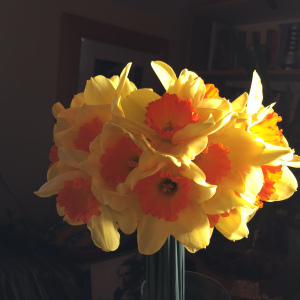
May might be considered an aberration. I began, participated in and completed four blogging university courses and no, I don’t have any badges to say so but I felt it might be useful and save me pressing the big red button that says ‘DO NOT PRESS THIS BUTTON’, because you known that’s the reason why I will.
Then I went away for the best part of a week at the beginning of June, to a wedding in the west of Ireland where I could smell the Atlantic Ocean, eat fresh seafood, drink Guinness, dance, one-legged with a walking stick, listen to the finest Irish traditional music and commune with other sentient beings. So that held me back and it took a while to get back into the rhythm.
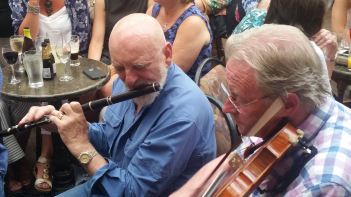
Matt Molloy (flute) and Sean Keane (fiddle), both of The Chieftains, in Matt Molloy’s pub, Westport, June 2016
I’ve met some really good people on WordPress, a vehicle I like to think is the thinking person’s social network, read some fascinating articles and poems, page turners, eye openers and head melt – ers, interacted with a whole bunch of engaged and engaging people, committed to what they do, anxious to help and encourage.
WordPress is a community and like all communities, the more engaged you become, the more engaging it becomes. Every few days I dip in the Community Pool, offering advice and friendly criticism. I’ve been known to have a go at daily, weekly and even monthly prompts, be they poetry, words or photos.
There are some things that get my goat and probably always will. I wish there was a ‘save’ button so you could come back and check out something you’ve seen but didn’t have time to read. You could ‘like’ it, I hear you call and I know that but if you ‘like’ too many things and there’s no ‘search’ engine, then the exercise recalls the needle and haystack story.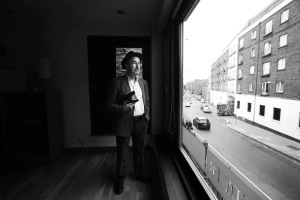
I don’t like aphorisms or affirmations but that’s just a personal thing. All quotations and aphorisms have their place and function. I’m not a religious person even if you might argue, like the NRA does about guns, that’s it’s not the religion, or the gun, that’s at fault, just the people, the sinners, who use them.
I’m a writer, so that’s what I do, I write. I don’t mind throwing in a couple of photos, here and there, or a poem, even a film, but when you get right down to it, I’m a writer and, as a writer, I want readers because I believe in that symbiotic relationship that writing creates and that I believe, as an art, is a unique relationship. I won’t write what people want to read. I write what I write and if people like it, then I hope they will read it and show their appreciation with a ‘like’ or a comment or, be adventurous, and buy some of my published work.

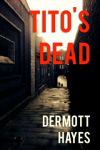
So far, in the space of 200 posts, almost half of them last month, 2,592 people have dropped by, 5,977 have viewed them and to all those, I am grateful and I hope you will continue to visit, like and comment.
Word Press is not somewhere I go to collect things. I don’t put subscriber numbers out for parade or display them, like trophies.
Word Press is inspirational and vibrant and challenging. These are the attributes I love the best about it. So that’s my sixpence worth which, I believe, is a good deal for 200 blogs. So, here’s to the next 200.


The Splendid Years – book review
The Splendid Years by Maire Nic Shuibhlaigh, with Edward Kenny, edited by David Kenny is an extraordinary book, not just for its provenance – the memoirs of a famous Irish actress and a founding member of Ireland’s National Theatre, as related to her nephew, journalist, Edward Kenny and subsequently, lovingly revived, edited and re-published by his son, journalist and broadcaster, David Kenny – but for its extraordinary story and its telling, bringing breathing, sweating, fighting flesh to the dry bones of history. And what history, too, for this is the story of Ireland’s national cultural awakening, at the turn of the 20th century. It is the story of a family – several members of Maire’s immediate family, the Walkers, worked in the Abbey theatre, backstage, onstage and front of house – but a movement, too. And it ends, fittingly, in the ruins of Dublin after the 1916 Rising, when Maire and other members of her family, did their part in the struggle for Irish freedom.
It is, above all else, a very human story and the people who stride the stage and the back rooms, although almost each of them, historic figures of Ireland’s literary, dramatic and revolutionary past, are all humans, here, with all their attendant faults, sharply and often wittily, observed. People like JM Synge, Lady Gregory, Countess Markievicz, WB Yeats, even Padraig Pearse and I think I caught a brief cameo appearance by James Joyce, at a rehearsal or in a drawing room and all this in the era whence Joyce wrote Ulysses.
So, without further ado, let me reproduce here, Final Act, Curtain…an article written for the IRISH TIMES by her great nephew, my friend and former colleague and editor of The Splendid Years, David Kenny.
Final act, curtain . . .
A founder actress of the Abbey Theatre, Máire Nic Shiubhlaigh recorded the surrender of Jacob’s garrison
Thu, May 23, 2013, 10:00
Dave Kenny
Máire Nic Shiubhlaigh (1883-1958), founder actor at Abbey Theatre who led Cumman na mBan at Jacob’s biscuit factory in the Rising.
Máire Nic Shiubhlaigh (Mary Walker), was a founder actress of the Abbey Theatre, and its first leading lady when it opened in December 1904. Her wan, ethereal beauty captivated audiences and critics in Ireland, London and the US. Portrait artists queued up to paint her. Revolutionaries and poets wrote plays for her. The Pearse brothers, AE, Countess Markievicz, Synge, WB Yeats (albeit grudgingly) all admired her. Dublin loved her.
In 1916, Máire, my grandaunt, put her acting career on the line when she took part in the Rising. While her father, brother and brother-in-law published the Irish War News for Pearse, and her sister carried dispatches for Cathal Brugha, Máire led the Cumann na mBan ‘girls’ in Jacob’s biscuit factory.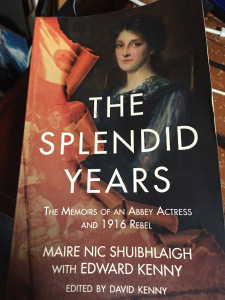
Once the State had gained its measure of independence, she quietly faded out of public view. Only her portraits in the Abbey and the National Gallery remain as testament to her extraordinary beauty.
In the mid-1950s my father, Ted, persuaded Máire to allow him to write up her memoirs. The Splendid Years was well-received but Ted was unhappy with the final edit and took it out of print in 1958. I have his revisions in a folder beside my desk and, some day, will get around to making them. What follows are abridged extracts, notably from her account of the surrender at Jacob’s garrison.
Máire spent the day before the Rising with Éamonn Ceannt and his family. Forty years on, as the embers grew dull in her hearth, she could still recall the rustling of papers and the hushed voices in the next room. Ceannt was struggling to countermand Eoin MacNeill’s cancellation of the general mobilisation order. He looked tired and strained as he walked her to the front door that evening. “Goodbye, Máire,” he said. She never saw him again.
She was at Mass in Glasthule the following morning when her father slipped into the church with a telegram. She was ordered to join Ceannt’s battalion as the “manoeuvres” were now going ahead.
On her way into town, a British military vehicle collided with her bike and badly gashed her knee. The “boy” soldier driving it was deeply upset at having injured such an important-looking woman. A bizarre battle of wills ensued as he tried, in vain, to put Máire and her bike into his car to take her to a doctor. She later recalled the bewildered Tommy scratching his head as she pedalled away to join the Volunteers who, by then, would have shot him on sight.
She arrived safely in town but failed to locate Ceannt, so she made her way to Thomas McDonagh’s garrison at Jacob’s just as the barricades were going up . . .
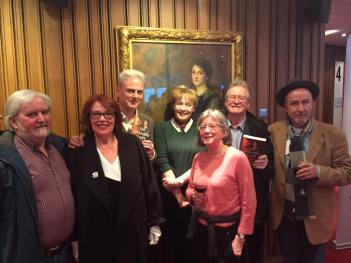
Extract from The Splendid Years
“The days passed quickly,” she would later write. “How can I describe how I felt this week? All the time I was divided between the excitement of being in Jacob’s, and worries for those whom I had left at home. I had no means of knowing what was happening in Glasthule. But mostly I was conscious of a great excitement. I am sure everyone in the building felt the same. I seldom felt tired, I never felt the need of much sleep for the four days.
“The great spirit of this whole period was all around us in Jacob’s, the enthusiasm, the wonderful feeling that underlaid every worthwhile activity in Dublin in those years. No one had any regrets – why should they have had? Until the surrender there was not a word of complaint from anyone I met. You never thought much about what the result of it all would be. You never assumed that victory was certain, but neither did you think of defeat. What might happen if we lost meant nothing: life or death, freedom or imprisonment, these things did not enter into it at all.
“The great thing was that what you had always hoped for had happened at last. An insurrection had taken place, and you were actually participating in it. The pity was that it ended so soon. The news of the surrender, when it came, was heartbreaking.
“Tom McDonagh was an excellent leader and had hid his responsibilities and his worries behind his good humour throughout the week, never allowing anyone to think other than that the fighting was going well. It was only when he sent for me at the end that his humour faltered slightly. Then he bore himself with dignity.
“He was standing behind his desk, beside Major MacBride. ‘We are going to surrender,’ he said, very simply. He seemed the same business-like person we had always known, until he spoke; his voice was quiet, and he seemed very disillusioned. He said, ‘I want you to thank all the girls for what they have done. Tell them I am issuing an order that they are to go home. I’ll see that you are all safely conducted out of the building.’
“I started to protest, but he turned away. One could never imagine him looking so sad.
“I went downstairs and into the bakeroom. I will never forget that scene. Almost everyone in the building had assembled on the ground floor. The announcement of surrender had just been made. It had not been taken well. There were shouts of ‘Don’t give in . . . we can’t give in now.’ Everyone was talking at once. The noise was deafening.
“I saw a man throw down his rifle and put his hands over his face. Another was smashing the butt of a gun against a wall. Some of the men seemed confused, as though they could not believe it. The officers were calling for order and trying to explain why surrender was necessary.
“Tom MacDonagh came in. He climbed on to a table and held up his hand. The noise died away at once. He said, very sadly: ‘We have to give in. Those of you who are in civilian clothes, go home. Those in uniform stay on. You cannot leave if you are in uniform.’ He stepped down.
“A Volunteer officer, Thomas Hunter, pushed his way through the crowd and climbed on to a bench. He held up his arms and shouted, ‘All I say is, any of you who go home now ought to be ashamed of yourselves! Stand your ground like men!’ There was a murmur of approval. No one moved.
“I gave the girls MacDonagh’s order. They did not want to leave. I could understand their feelings. They were my own; I did not want to go, myself. I told them what MacDonagh had said. He was anxious to have all girls out of the building before he surrendered. He feared that we would be arrested. If this had been the only consideration, I would have ignored his plea, and stayed; but he thought that the sight of the girls being arrested might upset the men. He wanted everything to go as quietly as possible.
“On the other hand, Sara Kealy said that it might be useful for a few girls to stay behind. They could write letters for the men and take messages to relatives. She announced her decision to remain. I did not press the matter.
“In the midst of much confusion, some Cumann-na-mBan women came in. They were on their way home and asked me to go with them. MacDonagh came through the crowd and asked, ‘Will you go now, please?’‘I don’t know, Tom. All the girls insist on staying’.
“MacBride was standing just inside one of the exits. ‘It would be better for you to go,’ he said. As we shook hands, he asked that a message be taken to some friends at Glasthule. ‘Tell them, too, that we had a good week of it,’ he added simply. Outside, a British officer was standing near one of the gateways. He said, ‘I’ll see you over the roadway, ladies.’
“We walked down the roadway and turned the corner into Camden Street. It was a route I had taken many times through the years. I cannot remember what we talked about – if we talked at all, for there did not seem very much to say. I felt confused and disappointed. All at once, I had begun to feel very tired.
“Along Camden Street the shop windows were shuttered and dark. We passed few people on the footpath. Everything looked strange, even the street was different. It was as though I had never seen it before. Despite what was going on inside, Jacob’s looked very dark, very empty. Dublin seemed unnaturally still.”
Back in the factory, a young Volunteer captain named Eamonn Price had been instructed to marshall the garrison for the surrender. He would later become director of organisation of the IRA and fight alongside Michael Collins.
He had spotted Máire joining the men on Easter Monday and had fallen hopelessly in love. Nine years later, surrounded by the ghosts of dead comrades, they were married in the city they had helped to liberate.
From The Splendid Years , Nic Shiubhlaigh/Kenny. Copyright David Kenny. dave@davekenny.com


Starman: Life on TrappistOne: The Origins
Starman: Life on TrappistOne began as a result of a WQWWC prompt, a little over a month ago. I chose David Bowie’s song , Starman, as the source of my quote for a story based on a new scientific discovery. Trappist-1 is the name of an ultra-cool dwarf star, near the sun and discovered recently by astronomers working in a giant telescope in Chile. Three planets orbit this dwarf star, which are 40 light years away. Now scientists want to discover if these planets could sustain human life.
Here is the official story of Trappist – 1.


June 16, 2016
Bloomsday, 2016
This extraordinary footage was shot in 1954, when a group of friends and well known, Irish literary figures set out on a mission to follow in the footsteps of Leopold Bloom, the hero of James Joyce’s Ulysses, set in June 16, 1904, in Dublin.
Among these well oiled literary pilgrims are Flann O’Brien, Patrick Kavanagh, Anthony Cronin, Tom Joyce, a dentist and relative of James Joyce and Dublin publican, John Ryan. They hired a couple of carriages to transport them for the day and, although things began well at Joyce’s Martello Tower in Sandycove, on the south side of Dublin bay, they went downhill, rapidly.
There were frequent stops for refreshment and relief, before the party pulled up in front of John Ryan’s bar, The Bailey on Duke St and there, the night ended. That day’s excursion, even though there’s mention of Bloomsday in Joyce’s own correspondence from as early as 1922, marked the beginning of a tradition that has continued, with varying levels of conviction and involvement, to the present day.
Now Bloomsday is celebrated, the world over. In Dublin, Bloomsday celebrations began five days ago, on June 11. The final day, today, began with Bloomsday breakfasts, served in venues throughout the city, Bloomsday cocktails, served in some bars and a colourful parade of people, throughout the city, dressed in period costume, sporting well thumbed copies of Joyce’s most famous work, tucked, firmly and discretely, under their oxters.
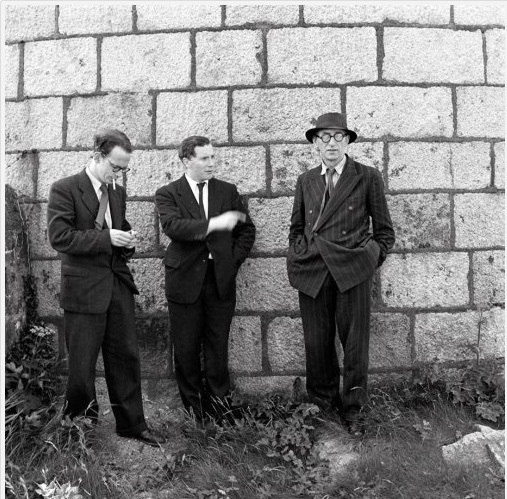
Literary pilgrims, Bloomsday, 1954, l to r, Anthony Cronin, John Ryan, Patrick Kavanagh, Martello Tower, Sandycove.


Postcard from a Pigeon
- Dermott Hayes's profile
- 4 followers







